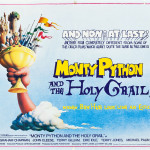[The Constitutional Peasants Scene] Here’s another episode about Monty Python’s Flying Circus, and in this one we’re going to be covering some very interesting topics, such as medieval history, old myths legends & folklore, the British monarchy, marxism and radical politics. In terms of language we’re going to look at some old fashioned formal poetic language, some political vocabulary and also some intonation and sentence stress, and we’ll be doing all of that while understanding and hopefully enjoying a funny scene from a classic British comedy film. So, you really are getting everything in this episode (well, maybe not everything but you know what I mean). A lot of this is transcribed at teacherluke.co.uk. If you find this episode on the website you’ll also see a video, a script for that video and more information. So let’s get started. Right-click here to download this episode.

Last time I did an episode about Monty Python we had a look at a sketch from the TV show. There are many more sketches which I hope to come back to in the future, but in this episode I’m going to focus on a scene from their first feature film, which is called “Monty Python & The Holy Grail”.
As a reminder: Do consider purchasing MP DVDs, CDs, audio & video downloads and even tickets to see live a live broadcast of their stage show. Details here: http://www.montypythonlive.com
Please remember – this is not a blog post, but an audio podcast episode. To get the full explanations and detail of this episode, you should listen to the whole podcast episode!
Monty Python & The Holy Grail
When was it made, who directed it, and all that stuff?
In 1975. It was written by all the Monty Python team but was directed by Terry Gilliam and Terry Jones. The two Terries were quite controlling & ambitious and decided they wanted to be in charge of the film, and in fact, during the production I think they agreed that the film could be directed by anyone called ‘Terry’, as an effort to keep control of the film.
What’s it about?
It’s about King Arthur’s search for the Holy Grail. It’s set in the 10th century – the middle ages, or ‘dark ages’, a time of mystery and legend! King Arthur is a legendary King of Britain. The legend of Arthur dates back to the 5th & 6th centuries and the story of Arthur has been told many times since. Historians disagree about whether Arthur really existed or not. In the stories, Arthur is said to be the magical leader who defended Britain against real and supernatural enemies. He carried a magical sword called Excalibur, which was given to him by a mysterious spirit known as The Lady of the Lake. The Lady of the Lake is an important figure in the Arthurian legend – she’s a kind of magical woman who got her powers from the wizard Merlin. She’s a bit like Galadriel in the Lord of the Rings stories. In Arthur’s story, This lady emerges from a lake, holding Excalibur and then presents it to Arthur, and in so doing chooses him as the rightful leader of the Britons. It’s hardly a democratic way to choose the executive commander of Britain, but that’s how things were done back in the 5th century!
The Grail in this story is another aspect of Arthurian legend. Apparently, this grail once carried the blood of Jesus, and was sent by Joseph to Britain where it would be protected. Perhaps this is true, perhaps this is just a myth, but the grail is still a potent symbol in British folklore, either as a connection to Jesus, or as a magical cup which can give magical powers to whoever drinks from it (it’s the same cup in the Indiana Jones movie “Indiana Jones and The Last Crusade”)
What happens in the film?
Arthur is sent on a mission by God to find the Holy Grail.
He travels around Britain, visiting castles and collecting a group of knights to help him on his quest.
It’s just an excuse to visit lots of old castles and film a bunch of medieval themed sketches.
Most of it was filmed in Scotland, and the scenery is absolutely beautiful.
It was filmed on a budget of just $400,000, which is tiny in comparison to today’s standards. The Hangover 3, for example, had a budget of $103 million!
The film was financed partly by rock stars Pink Floyd, Led Zeppelin and Elton John.
It’s now considered one of the funniest British comedy films of all time, and in 2005 it was used by Eric Idle as the basis for the Monty Python musical “Spamalot” which you can see in theatres in London and around the world.
There are a few classic sketches in the film, and I’d like to play one of them for you.
“Constitutional Peasants” – King Arthur Has an Argument with Some Left-Wing Peasants
Arthur is travelling the land, trying to recruit knights to join him on his quest. He visits lots of castles. In this scene, he is approaching a castle, and meets some peasants working on the land. The peasants appear to just be collecting mud & filth from the floor in a field. They’re disgusting & dirty, and yet surprisingly articulate in the language of politics (which is part of the joke). King Arthur decides to ask them for information about the owner of the castle. The peasants don’t give him any useful information. Instead he gets into an argument with one of the peasants about the constitution, monarchy, democratic government and the oppression of the masses in an absolute monarchy.
Constitutional Peasants – Video (you’ll find a script below)
What’s So Funny About This?
One of the funny things about this scene is the anachronism (I mean, the fact that different time periods are mixed up). The king is from the medieval period, but the peasants are basically modern working class people. So it mixes up people from different time periods. The scene also mixes two different speech registers and two different political ideologies as the characters represent different political systems, and we see them argue. It’s unexpected because peasants in the middle ages were unaware of Marxist ideology, and certainly wouldn’t have been intelligent or educated enough to criticise the system in such an articulate way. Arthur speaks in a poetic & medieval way, and represents the system of absolute monarchy which was in place at the time. The peasant speaks like a modern left-wing radical using ideas founded by Karl Marx in the 19th century.
It’s also a joke about conventions of movies or stories set in medieval times in which peasants are always presented as old, dirty and inarticulate servants of the king. When these peasants speak like Marxists from the modern era, it’s quite a surprising & amusing shock.
I realise that now I’ve explained this scene, you probably won’t find it that funny, because explaining humour takes all the immediate fun out of it, but so be it. If you get the humour, good for you! The main thing is: We’re learning English aren’t we, so let’s focus on understanding the scene before trying to see the funny side. This scene is very rich in vocabulary, in either a poetic medieval register, or the language of left-wing politics. Listen to it once to see if you understand it all, and then I’ll explain it all to you afterwards. If you find any of it funny, then that’s a bonus as far as I’m concerned. :)
Vocabulary & Explanations
So, in a nutshell, King Arthur wants to know who lives in the castle, and he asks a couple of peasants, but they don’t help him. Instead he gets involved in an irritating argument about the exploitation of the working classes in this medieval monarchy.
Concepts
There are a few concepts which we need to study in order to fully appreciate this scene. Let’s look at some of those concepts before listening to the scene again. These concepts relate to different constitutional frameworks – I mean, different ways in which a country can be run. We’re talking about political systems like ‘absolute monarchy’, ‘democracy’, ‘Marxism’ and ‘anarchism’.
Absolute Monarchy – in this case a king (monarch) is not elected, but gets their supreme power by divine provenance. This means that the monarch has a special agreement with god. God has chosen the monarch to be the leader of these people. Usually, this is tied to old mythical stories which involve some supernatural intervention in which the king is chosen by god. In the case of King Arthur this was when he was given a holy sword (Excalibur) by a magical & mythical woman called The Lady of the Lake. The story goes that this lady is a kind of supernatural & mythical spirit who holds magical and religious authority. In the story she walks out of a lake and presents Arthur with his magical sword, which signifies that he is the divine ruler of Britain. Most monarchies justify their existence by suggesting they have some kind of special connection to god. In this sketch, Arthur believes he is the rightful ruler of the Britons because of his divine right given by god.
Democracy – in this case, the people give executive power (decision making power) to a representative by voting for him/her. The people give this leader a ‘mandate’ – which means a responsibility to run the country. It’s the government by the people, of the people and for the people. Churchill said that democracy is not perfect, but it’s better than the alternatives. In the UK today we have a democratic monarchy, which is basically a democracy (we vote for MPs in elections) but with a monarch as head of state with almost no executive power. The Queen has very minor powers, and she doesn’t exercise them. It’s like there is an understanding between parliament and the monarchy that the monarch just lets parliament run the country. The monarch doesn’t interfere. That’s the way our country works. Some people are concerned that Prince Charles might decide to exercise his power if/when he becomes king, which could cause a constitutional crisis, but that’s another story for another time.
Marxism – this isn’t really a constitutional system, but an political ideology, or a way of understanding the way in which most industrial/post-industrial capitalist systems work. Karl Marx was a German born philosopher, economist, sociologist and historian who basically stated that the ruling classes manage to maintain control of the system by owning the means of production, and that the working classes are therefore dominated and repressed. The only way in which true equality can exist is if the people own their own land, their own factories and the means of producing goods. His ideas formed the basis of many left-wing political models including communism, and also form the basis of many criticisms of the capitalist system in general. In the UK, we sometimes associate Marxist ideologies with certain types of people. Although their views may be valid, I think most ordinary people find Marxists to be a bit extreme and even boring – banging on about politics and the class system all the time, while not necessarily doing anything about it.
Anarchism – this is the idea that there should be no leaders at all, and in fact no formalised system of government or state at all. Instead, local communities should be run by free and open groups with no leader. The idea is, that formalised governments, or power structures are essentially corrupting – that when power is given to one or several representatives, elected or not, that this ultimately will corrupt them and that this leads to inequality. So, anarchists argue that there should be no system at all, and that people should be free to govern themselves in a completely open way – without adopting any kind of political ideology or dogma. For me, in principle this sounds great, but on a practical level it sounds chaotic, confusing and impractical. Ultimately, it would be great to remove the corrupting power of government, but are we ready for it? We’d need an intelligent and activated population. Education is key. The problem, to an extent, is that many people don’t really care about these issues and instead just find political discussion boring, therefore making it very hard for true anarchy to take effect. A bit like Marxism, many people find anarchists to be either boring, confusing or somehow threatening to normal life.
Vocabulary
OK, so we’ve looked at some ideological concepts at the heart of this sketch, but we’re not finished because there’s plenty of language to deal with too. It’s complex isn’t it!? You see – British comedy is intelligent and deep, particularly Monty Python. It’s not just weird.
Here’s some vocabulary that you should know in order to understand this sketch further. Remember that Arthur speaks in old fashioned language, and Dennis the peasant speaks like a modern man with radical political opinions. Listen to the episode to hear all the bold words defined.
What knight lives in that castle over there?
– a knight is (in the Middle Ages) a man who served his sovereign or lord as a mounted soldier in armour. In this context it means a leader.
you automatically treat me like an inferior
exploiting the workers!
– exploiting means to benefit unfairly from the work of (someone), typically by overworking or underpaying them: “women are exploited in the workplace”.
hanging on to outdated imperialist dogma which perpetuates the economic and social differences in our society
-dogma = a principle or set of principles laid down by an authority as incontrovertibly true: the dogmas of faith | [ mass noun ] : “the rejection of political dogma”.
Dennis, there’s some lovely filth down here.
I didn’t know we had a king. I thought we were an autonomous collective.
– autonomous = • having the freedom to act independently: “school governors are legally autonomous”.
You’re fooling yourself. We’re living in a dictatorship: a self-perpetuating autocracy in which the working classes–
– an autocracy = a system of government by one person with absolute power.
Oh, there you go bringing class into it again.
Please! Please, good people. I am in haste. Who lives in that castle?
Dennis: I told you. We’re an anarcho-syndicalist commune. We take it in turns to act as a sort of executive officer for the week,…
Arthur: Yes.
Dennis: …but all the decisions of that officer have to be ratified at a special bi-weekly meeting…
Arthur: Yes, I see.
Dennis: …by a simple majority in the case of purely internal affairs,…
Arthur: Be quiet!
Dennis: …but by a two-thirds majority in the case of more major–
– ratify = sign or give formal consent to (a treaty, contract, or agreement), making it officially valid. “both countries were due to ratify the treaty by the end of the year”.
– a simple majority = this candidate receives more votes than anyone else (but it doesn’t have to be more than 50% of all votes cast) e.g. if Obama, Bush & Clinton are in an election and Clinton gets 40% and Obama & Bush get 30% each, Clinton gets a simple majority. She just gets more votes than the others.
– a two-thirds majority = at least 66% of all the votes
– an absolute majority = at least 51% of all votes
Woman: Well, how did you become King, then?
Arthur: The Lady of the Lake,… [angels sing] …her arm clad in the purest shimmering samite, held aloft Excalibur from the bosom of the water signifying by Divine Providence that I, Arthur, was to carry Excalibur. [singing stops] That is why I am your king!
– samite = a rich silk fabric interwoven with gold and silver threads, used for dressmaking and decoration in the Middle Ages.
Dennis: Listen. Strange women lying in ponds distributing swords is no basis for a system of government. Supreme executive power derives from a mandate from the masses, not from some farcical aquatic ceremony.
I mean, if I went round saying I was an emperor just because some moistened bint had lobbed a scimitar at me, they’d put me away!
Dennis: Oh! Come and see the violence inherent in the system! Help! Help! I’m being repressed!
Arthur: Bloody peasant!
Dennis: Oh, what a give-away. Did you hear that? Did you hear that, eh? That’s what I’m on about. Did you see him repressing me? You saw it, didn’t you?
What I love about this is that it’s a well written script, with different types of English and it manages to mock both the idea of a medieval monarchy, and also the irritating verbosity of political radicals. Monty Python are making fun of history & taking the piss out of everyone, while at the same time celebrating the language. Complex language, delivered at speed by colourful characters is at the heart of the humour in this sketch.
Intonation & Sentence Stress
I really enjoy the performances in this scene – particularly Michael Palin who plays Dennis the peasant. The lines are delivered with quite exaggerated and characterful intonation and sentence stress. To highlight this, I’m going to read the script of this scene, just to make it a bit clearer. You could listen to the original version again in order to, hopefully, appreciate it a bit more.
Constitutional Peasants – Script
Arthur: Old woman!
Dennis: Man!
Arthur: Man. Sorry. What knight lives in that castle over there?
Dennis: I’m thirty-seven.
Arthur: I– what?
Dennis: I’m thirty-seven. I’m not old.
Arthur: Well, I can’t just call you ‘Man’.
Dennis: Well, you could say ‘Dennis’.
Arthur: Well, I didn’t know you were called ‘Dennis’.
Dennis: Well, you didn’t bother to find out, did you?
Arthur: I did say ‘sorry’ about the ‘old woman’, but from the behind you looked–
Dennis: What I object to is that you automatically treat me like an inferior!
Arthur: Well, I am King!
Dennis: Oh, King, eh, very nice. And how do you get that, eh? By exploiting the workers! By hanging on to outdated imperialist dogma which perpetuates the economic and social differences in our society. If there’s ever going to be any progress with the–
Woman: Dennis, there’s some lovely filth down here. Oh! How d’you do?
Arthur: How do you do, good lady? I am Arthur, King of the Britons. Whose castle is that?
Woman: King of the who?
Arthur: The Britons.
Woman: Who are the Britons?
Arthur: Well, we all are. We are all Britons, and I am your king.
Woman: I didn’t know we had a king. I thought we were an autonomous collective.
Dennis: You’re fooling yourself. We’re living in a dictatorship: a self-perpetuating autocracy in which the working classes–
Woman: Oh, there you go bringing class into it again.
Dennis: That’s what it’s all about. If only people were aware of–
Arthur: Please! Please, good people. I am in haste. Who lives in that castle?
Woman: No one lives there.
Arthur: Then who is your lord?
Woman: We don’t have a lord.
Arthur: What?
Dennis: I told you. We’re an anarcho-syndicalist commune. We take it in turns to act as a sort of executive officer for the week,…
Arthur: Yes.
Dennis: …but all the decisions of that officer have to be ratified at a special bi-weekly meeting…
Arthur: Yes, I see.
Dennis: …by a simple majority in the case of purely internal affairs,…
Arthur: Be quiet!
Dennis: …but by a two-thirds majority in the case of more major–
Arthur: Be quiet! I order you to be quiet!
Woman: Order, eh? Who does he think he is? Heh.
Arthur: I am your king!
Woman: Well, I didn’t vote for you.
Arthur: You don’t vote for kings.
Woman: Well, how did you become King, then?
Arthur: The Lady of the Lake,… [angels sing] …her arm clad in the purest shimmering samite, held aloft Excalibur from the bosom of the water signifying by Divine Providence that I, Arthur, was to carry Excalibur. [singing stops] That is why I am your king!
Dennis: Listen. Strange women lying in ponds distributing swords is no basis for a system of government. Supreme executive power derives from a mandate from the masses, not from some farcical aquatic ceremony.
Arthur: Be quiet!
Dennis: Well, but you can’t expect to wield supreme executive power just ’cause some watery tart threw a sword at you!
Arthur: Shut up!
Dennis: I mean, if I went round saying I was an emperor just because some moistened bint had lobbed a scimitar at me, they’d put me away!
Arthur: Shut up, will you? Shut up!
Dennis: Ah, now we see the violence inherent in the system.
Arthur: Shut up!
Dennis: Oh! Come and see the violence inherent in the system! Help! Help! I’m being repressed!
Arthur: Bloody peasant!
Dennis: Oh, what a give-away. Did you hear that? Did you hear that, eh? That’s what I’m on about. Did you see him repressing me? You saw it, didn’t you?
![]() This episode is all about zombies – the undead, flesh eaters, walkers, biters, the infected – whatever you want to call them, zombies have become an indelible part of our popular culture now. There are zombies in the cinemas, zombies on TV in shows like AMC’s The Walking Dead, zombies in computer games, zombies online, even zombie walks in which people get together in large groups in order to dress up like zombies and walk around going “uhhhhh”. We’re pretty obsessed by zombies, and I am too. I love zombies and zombie films. Maybe that makes me some kind of sick and twisted individual, but I’m not alone. In fact, I think that zombies are perhaps as popular and present in our culture as vampires and ghosts. But, what is some of the history behind the zombie phenomenon? Where do they come from? What do they want? Why are we obsessed by zombies? How can you survive if zombies really attack? And, how do we talk about zombies in English? That’s the focus of this extra-special and extra-creepy episode of Luke’s English Podcast.
This episode is all about zombies – the undead, flesh eaters, walkers, biters, the infected – whatever you want to call them, zombies have become an indelible part of our popular culture now. There are zombies in the cinemas, zombies on TV in shows like AMC’s The Walking Dead, zombies in computer games, zombies online, even zombie walks in which people get together in large groups in order to dress up like zombies and walk around going “uhhhhh”. We’re pretty obsessed by zombies, and I am too. I love zombies and zombie films. Maybe that makes me some kind of sick and twisted individual, but I’m not alone. In fact, I think that zombies are perhaps as popular and present in our culture as vampires and ghosts. But, what is some of the history behind the zombie phenomenon? Where do they come from? What do they want? Why are we obsessed by zombies? How can you survive if zombies really attack? And, how do we talk about zombies in English? That’s the focus of this extra-special and extra-creepy episode of Luke’s English Podcast.
















